#she wants to show her children overcoming flaws
Text
I have a germ of a theory that good Christian fiction has stories that are less about shaving down your personality to meet some specific mold of what a good Christian looks like, and more about "how gloriously different are all the saints."
Not that the Christian life doesn't involve fighting against our own sinful nature and conforming ourselves to Christ-like behavior, but I think it makes for better, more realistic, and more universal stories when you also recognize that people have different gifts and flaws and they're going to be called to use their unique personalities to serve the kingdom of God in their own unique way, instead of assuming everyone has to conform themselves to a very specific (often secular-culturally based) image of good behavior. It makes for a much more vibrant story.
#catholic things#books#i'm still ruminating on charlotte yonge#because i usually contrast modern christian fiction with how the classics incorporated christianity#but she's the first classic victorian author i've found that i'd describe as writing christian fiction#which makes for a more direct comparison#she did handle religion in some very good ways#but i tried another of her books after 'heir'#and it reminded me of what i didn't like about the childhood section of 'heir'#but magnified a lot#she wants to show her children overcoming flaws#but she has a very narrow english anglo-catholic view of goodness#and that means her idea of christianity can come across as very judgemental and narrow-minded#things that are not actually sins in and of themselves are treated as moral failings inherent to other cultures#and the kids spend so much time worrying about cutting out sin that you don't get to see enough of their unique personality#i'd be willing to try more from her but i think i'd have to stick to the stories about adult characters
300 notes
·
View notes
Text
Thinking about redemption yesterday got me thinking about fallen heroes today, and how rare it is to see a character initially painted as a hero be driven to heinousness for legitimate reasons.
Often times, if a hero goes bad, it's because of an external force corrupting their mind. Or it's a misunderstanding and they were secretly still good all along. Or they were just having a rough day and they'll be good again in five minutes.
We rarely see get to see heroes go sour purely on their own merits. Maybe because their values weren't so benign as they'd seemed when pushed to a natural conclusion. Maybe because they expected too much of themselves or of others. Or maybe personal experience taught them to believe something else.
Whatever the case, as often as writers will attempt to examine the transformative power of better angels, we rarely get to see the transformative power of worse devils.
Which brings me to....
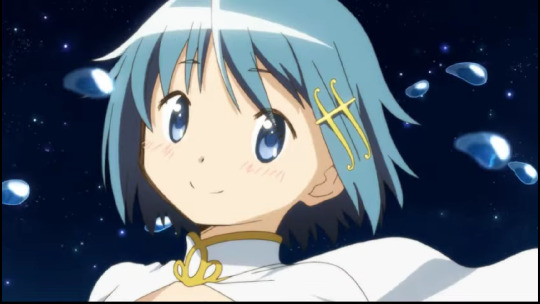
Sayaka Miki is a character that holds a special place in my heart, not for overcoming her flaws but for being consumed by them. She's a cautionary tale into the perils of righteousness.
I need to preface this by bringing up that the characters of Madoka Magica are children. They're irrational, judgmental, ignorant of risk, and quick to throw themselves into horrible mistakes with absolute confidence. Because they're children. That's how this works. The villain of the series is a psychological predator who feeds on the impulsivity and poor judgment of youth, grooming them into self-destruction.
The entire system of Magical Girls exists to give these children enough rope to hang themselves with and then to kick the ladder out from under them. That is the plot, with Sayaka being the primary means by which the show demonstrates the complete journey from rope to ladder.
I just. I need you to understand that even at her worst, Sayaka is a victim of predatory incentives and calculated coercions meant to cultivate her worst traits while stripping her of hopes and dreams. To drown her in mistakes she could never take back. She didn't have the life experience to know better. That's why her predator targets children.
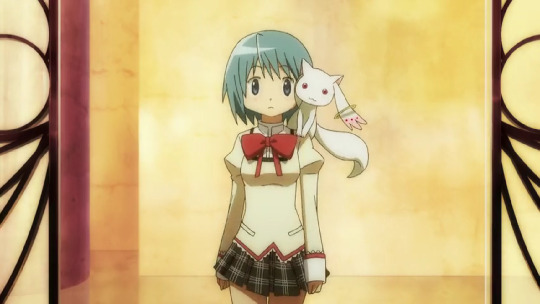
Sayaka's rope is woven from virtuous self-image. It's not immediately apparent when we meet her, but Sayaka's fatal flaw is ego. Her moral compass is wound extremely tight, and it's only later that we realize it's wound around her neck.
Like many children, Sayaka is trying on an identity moreso than expressing her inner self. She wants to be altruistic. She wants to be selfless. She wants to be a true hero. She wants to live by nothing more than high-minded ideals, expecting no reward for her efforts (but receiving it all the same).
She wants to be the kind of person that Mami was.
But she has no idea who Mami was. She wasn't there to see Mami fracture. To see her break down in vulnerability and express the isolating misery she lives in.
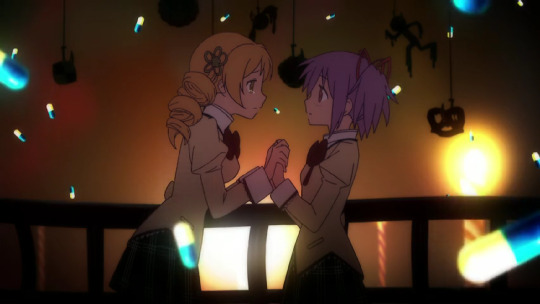
Sayaka didn't see that. She only saw how cool Mami looked when she was killing Witches. So when she tries on an identity, she's specifically trying on the identity of Mami - blissfully unaware that her interpretation of Mami was nothing but a mask. She is emulating the behavior of a victim already consumed by the predatory incentives she's accepting.
Sayaka was doomed from the moment she made her wish.
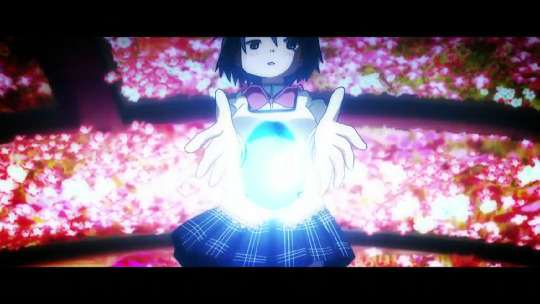
Once again, the show does a brilliant job of concealing this at first. Right off the bat, it's easy for Sayaka to be the hero. She saves both her BFFs Madoka and Hitomi from a Witch in her debut adventure, before being immediately thrust into a moral argument that's super easy for her to win.
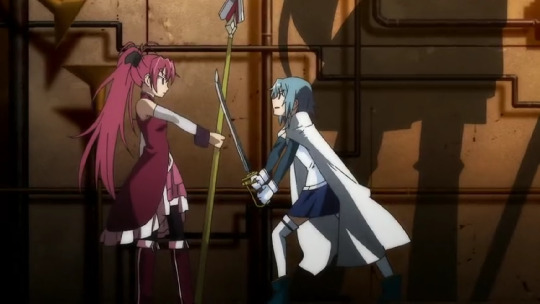
This is what a hero looks like! Should we stand by and let monsters eat people YES/NO
Sayaka says no. Sayaka says letting monsters eat people is bad. Solid Bioware-level moral dilemma she's got here. Sayaka won +10 Paragon points for the choices she picked out of this conversation tree, lemme tell you!
Moments like this work to disguise what's going on here with Sayaka. Obviously Sayaka's making good choices and doing the right thing when the alternative is Kyoko going "Want me to break your crush's limbs so he needs you for life support?" That's awful, so since Sayaka's against it then that means she must be right. Right?
Kyoko is the devil. Sayaka is the paragon.
But this is a story about nuanced and complex people. Sayaka isn't that person. Sayaka likes the idea of being that person. She's being dishonest - With herself, with others around her, and with the universe.
She's trying on an identity, not fully understanding who she really is or what her limitations are.
Incidentally, so is Kyoko, which is what makes their Yin and Yang dichotomy so potent. Having never been tested like this before, Sayaka is more selfish than she truly understands - While Kyoko, damaged by trauma, is more selfless than she wants to believe.
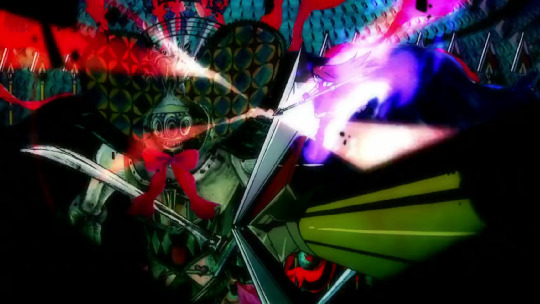
The thing Sayaka doesn't quite grasp is that, to an extent, it's okay to be selfish. It's okay to want things for yourself. Again, the identity she's trying to live up to was a lie to begin with. She only saw the mask; Never the humanity underneath. So she fails to recognize her own humanity; Her own needs and wants and desires.
She imprisons her own mind in a cage of altruism.
Sayaka is warned multiple times against spending her wish on another person. But she doesn't understand the perils of it. She lacks the necessary perspective to grasp the level of sacrifice she's making. (Because she is a child. I cannot stress this point enough.)
When she makes her wish, Sayaka wants her sacrifice reciprocated. She wants to be rewarded. But she doesn't want to want that. She wants to be the selfless hero for Kyosuke. To silently grant him a miracle because it's the right thing to do for her friend. But she expects, without consciously thinking about it, that the universe will deliver her nice things because she is good.
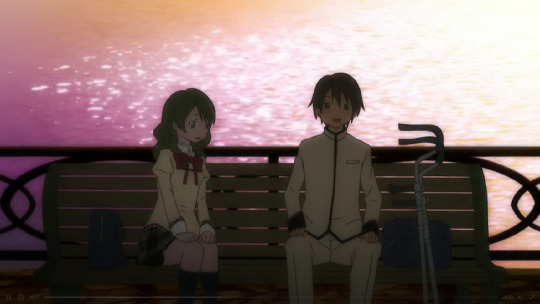
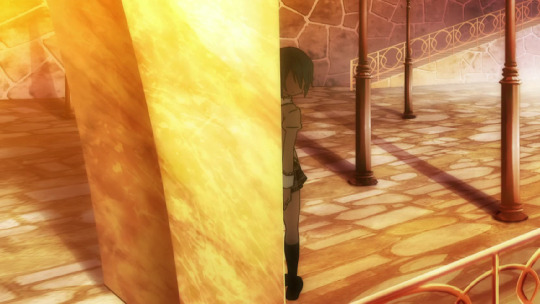
But life doesn't work like that. It doesn't give you things you aren't willing to reach for. Sayaka said she just wanted him to be happy. She just wanted to help people. She just wanted to dedicate her life to virtue and altruism, with no wants or needs or desires of her own.
Kyoko was being cruel and unfeeling when she suggested crippling Kyosuke; She was trying to express a mask of selfishness, the same way Sayaka's been trying to express a mask of selflessness. But she wasn't the only person telling Sayaka that it was a mistake to do this. She's just the only person who said it after the fact.
So the universe calls her bluff. While Sayaka waits for her sacrifices to be rewarded, fracturing more and more from learning what those sacrifices truly entail, someone else claims her prize. The work gets harder, not just physically but emotionally. And she only gets what she asked for. Nothing more.
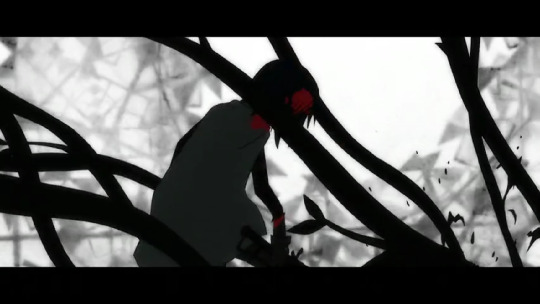
This is what a hero looks like. She wanted to be Mami.
Remind me. What was Mami's reward for her sacrifices?
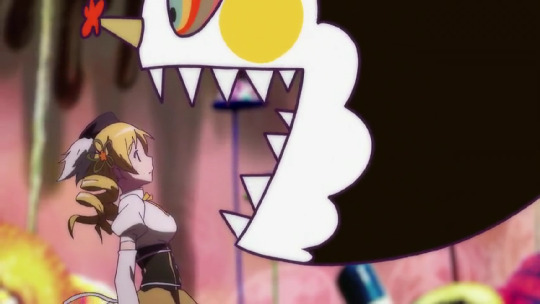
Oh. Yeah. That's right.
The thing of it is, there is a reward for a Magical Girl's sacrifices. There is a prize you're meant to receive for the unjust hardships and self-destruction that you're volunteering to undertake.
It's the fucking wish.
That she, in her righteousness, gave away.
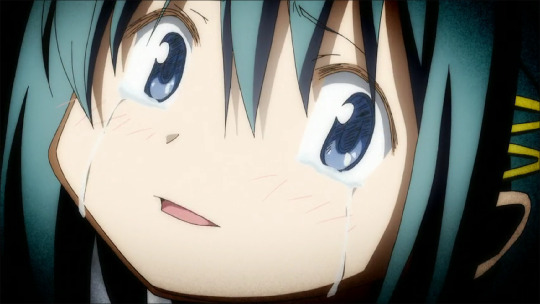
Sayaka's rope is woven from virtuous self-image. Her fatal flaw is ego. She was undone by arrogance expressed in ignorance, not of glory the way we often think of egotistic people, but of righteousness. She held herself to a standard no reasonable person could ever live up to, and it crushed her as it came crashing down.
And yet, she was a victim all the same. Because she was walked, hand-in-hand, to that pier by a predator. Children are meant to learn from their mistakes. Not to die for them.
82 notes
·
View notes
Text
I think that the reason why I love Zelda's character so much is, while I do like the other female characters, they just seem so much more flat and stagnant in comparison. Zelda feels more like an actual person to me. Her character isn't entirely just "scientist" or "princess" or "in love with Link", unlike the others, she actually has things outside of that. She has more than one character trait. She develops.
Zelda didn't even like Link at the very start (for reasons that are very relatable and make her feel more human and flawed) or want to be a princess (at least not in the way others wanted her to be). She went through a period of depression, she has anxieties, she can be assertive, strong-willed, she gets frustrated, she doesn't just have one interest, but several. Massive nerd (and continues being a nerd off-screen with Mineru in the past). Founded a research team. She loves frogs and is the likely cause behind Hateno becoming overrun with them. She founded a school and teaches children, she tries to help people whenever and wherever she can, she tries new things (like painting), she is a selfless leader who is willing to make heavy personal sacrifices for her people, she actually has an arc and grows as a person over time, overcoming her insecurities. She plans ahead, and she can think on her feet. The great sky island was her idea. I know that she's now able to cook at least one normal meal without involving frogs and monster parts. She loves fruitcake and the Silent Princess flower. She went from being bad with horses to catching one on her own. Age of Calamity shows her leading troops, shows that she actually does have some form of archery knowledge (if albeit divine), and that she would make much better use of the master cycle if given the chance. She saves and protects Link even when she has lost herself. She is (according to a dev interview) trying to figure out what future she wants for herself, who she wants to become, what her place in the world is.
And, when it does come to her love for Link, it isn't some shallow infatuation based purely on him being attractive, but because they have an actual connection, a past together. She learned who the real Link was, he opened up to her alone about his deepest insecurities, and her affection towards him grew from that connection. Zelda loves the real Link. She knows Link better than anyone else, and she trusts him implicitly. It isn't the shallow celebrity crush the npcs have.
#totk spoilers#princess zelda#zelda#totk zelda#botw zelda#zelink#totk#loz#tloz#and i've probably still left something out#she is great#oh! and she loves dogs
357 notes
·
View notes
Text
So over the past few weeks, I’ve been toying with the idea of writing a retelling of the OG series from Annabeth’s perspective.
I’m interested in doing this because though I loved the PJO when I was a child, as I grow older, I find myself craving more nuance from the stories and the characters than what’s already there on the page. I thought hopefully the show would fulfill me, but uhh….amazing character depth is not one of the things I’d call the show’s biggest strong suits, at least not for Annabeth.
Now, I’m aware of the “Daughter of Wisdom” series on AO3, a fanfic series that does the exact same thing. I read that fic years ago and enjoyed it; I thought at the time that the fic was well done. However, I have a lot of ideas for scenes and details that I don’t think really showed up in that fic series, and so I find myself craving to create the POV for Annabeth and certain aspects of CHB that I’ve always wanted to see. I also wanted to spend more time emphasizing emotions and growth for Annabeth in a fic like this, and actually have her challenge and address her pride, sort of like a “I’m overcoming my biggest flaw” journey. I want to write this series from a sympathetic yet honest perspective about Annabeth’s life and her traits…including the traits that are not so pretty.
And so I want input from y’all on what you think would be worth including in a fic like this, and if there’s anything from the OG books that I should change, twist, replace, remove, deepen, or add something new. Here’s a list I already have going:
- emphasis on Annabeth’s relationship with Chiron and how it develops
- more emphasis on Annabeth’s relationship with Grover and how they get along when Percy isn’t there. Do they talk about Percy? And what do they think of each other? Does Grover feel intimidated by Annabeth, or feel like maybe she’s not proud of him because he let her down with the Cyclops incident and Thalia getting killed? Maybe at the end of the quest in TLT, before Percy gets back from Olympus, Annabeth reassures Grover that he’s a great protector and that she doesn’t resent him at all.
- Annabeth’s view of Luke and how/why it becomes complicated; how Annabeth reconciles the objectively bad things Luke has done with her desire for his redemption
- an emphasis on Annabeth and Thalia’s relationship after Thalia returns. How has it changed, Thalia remarking on Annabeth’s growth and teasing her about her crush on Percy, Annabeth helping Thalia cope with the loss of Luke to the “dark side” and also helping Thalia cope with how much the world has changed in 5 years and how Thalia now feels so out of place, Thalia helping Annabeth cope with continuous family struggles
- an emphasis on Annabeth’s relationship with other Athena children. Do they like each other? Hate each other? Are they competitive, all vying for their mom’s attention? Do they share some of Annabeth’s struggles; were their mortal parents also unimpressed about receiving a child they didn’t plan for?
- Annabeth’s relationship with other kids at camp: namely Clarisse, Silena, Beckendorf, and the Stoll Brothers (no, I don’t ship Connabeth, btw). But I also want to flesh out Katie Gardner and Pollux/Castor too.
- a proper resolution to Annabeth’s family drama that yes, recognizes how Frederick had a baby sprung on him that he didnt consent to, and how Mrs. Chase had no idea how to take care of a kid with special needs, but a resolution that also validates Annabeth’s feelings and highlights the ways in which Mr. and Mrs. Chase messed up and failed her with their poor choices.
- a new interpretation of Luke’s “did you love me”question
- An on-page apology from Annabeth to Rachel
- Annabeth’s relationship with her little brothers and how they might still try to love each other in context of their family drama, and not repeat the sins of their parents (breaking generational curses!)
- more emphasis on Annabeth and Athena’s relationship, and how Annabeth evolves from thinking her mother is this image of perfection, to realizing that Athena is just as faulty as the other gods and goddesses, and that Annabeth has a strength over Athena in that Annabeth has a bigger sense of humanity, and can change and adapt when she’s not doing something well. Annabeth can evolve in ways Athena cannot.
Anything else?
#rick riordan#annabeth chase#percy jackson#pjo#percy jackon and the olympians#pjo hoo toa#heroes of olympus#percabeth#thalia grace#luke castellan#grover underwood#the lightning thief#anti annabeth chase#anti percabeth
85 notes
·
View notes
Note
I keep seeing this frustrating post about how Anakin wouldn't have fallen if the Jedi made him a Creche Master because "babies need attachments!" No. Babies need support and love. Anakin would have SUCKED as a Creche Master. Because the Younglings would LEAVE. I have a feeling he would have sabotaged as many as he could get away with to keep them with him. Because he STILL has the flaw, he believes people belong to him. Not to themselves. He MAYBE wouldn't have killed ALL the Younglings. But he would have taken them to be raised as Darksiders and in Sith teachings so is that really better then death?
Sure I giggle about Creche Master Anakin as an AU. But when people start insisting it's the RIGHT PATH... yeah no. Those kids would have been miserable.
I've definitely seen posts about how the Jedi were terrible people for "forcing" Anakin to be a soldier instead of allowing him to be a Creche Master, as if Anakin wasn't saying from DAY ONE that he wanted to be a Jedi because he wanted to be a big hero who came back to free the slaves. That's not the kind of work a Creche Master does and the kind of work a Creche Master does doesn't seem like something Anakin would be too terribly interested in.
He reacts pretty negatively to being handed a teenaged Padawan and tells her not to "slow him down," so I don't really see him being particularly patient with little kids, personally, or happy to just sit around being nurturing and cleaning up messes and providing enrichment and dealing with temper tantrums. He'd HATE IT. He's honestly TERRIBLE as a teacher to Ahsoka, too. His early attempts at bonding with her suck, his idea of helping Ahsoka overcome a massive fuck-up that caused several people to die is to put himself in danger and force her to be the only leader in charge and if she fails, they literally all die, and he offers her zero support in that. He's late to what appears to be an important Jedi test and when she does well, he doesn't praise her at all and instead tells her that the test is inadequate. And of course the training he ends up giving her involves shocking her into unconsciousness in an unsafe environment for hours upon hours. When Ahsoka ultimately decides to leave the Jedi, his pleas for her to come back are all about HIMSELF and he practically accuses her of being an idiot for refusing to stay.
Nothing about his one relationship with a child in his care really ever shows that he'd be GOOD at handling children as his JOB. Or that he'd even WANT to. And like a lot of people have been saying about going into jobs like that in real life or about becoming a parent, this is the kind of thing you really should feel 100% committed to before making that choice.
I don't think Anakin would've intentionally sabotaged the Order by trying to make its children leave. He does obviously somewhat unintentionally encourage a mistrust of the Council and a judgment of the Order with Ahsoka, but he never wants her to leave. Like I said earlier, he actively insists that she has to come back to the Order when she tries to leave and makes her choice all about himself. He gets accusatory and tells her she CAN'T just throw this life away even though she's already said she feels like she can't trust herself right now. Anakin refuses to leave the Order himself, he doesn't really want to because he does want the things that come with it, he just doesn't tend to like Jedi teachings or the limitations that ALSO come with being a Jedi. He wants to have all of the positives of being a Jedi and none of what he'd consider negatives. So even if we pretend Anakin might've been willing to become a creche master of some kind, I don't see him intentionally sabotaging them. I don't think he even realizes he's doing that to Ahsoka at all, he's completely shocked when she runs during the Wrong Jedi arc and when she leaves at the end.
But I do think he'd have a negative impact on the kids, I do think he'd end up possessive of them. I think he'd probably play favorites and be overly harsh when having to deal with discipline or just actively neglectful towards some of them. I think Anakin would be constantly frustrated and annoyed by the kids if they weren't acting the exact way he wanted them to. I think he'd have a hard time trying to connect to them and would desperately want to pass them off onto someone else to deal with the worst problems. The concept of Anakin stealing some of those favorites during Order 66 to raise them as Sith or Inquisitors of some kind is absolutely devastating.
This is also why I giggle at those silly little board books about Darth Vader the father with baby Luke and Leia, but also like holy shit the concept of Luke and Leia being raised by Anakin, especially once he's chosen to be Vader, is HORRIFYING as a concept. It would NOT be this cute sweet little thing, Luke and Leia would be so fucking miserable and they'd probably both turn out really badly as a result of such a terrible upbringing.
I don't think anything in ROTS really indicates he wants kids, either. His reaction to Padme's revelation that she's pregnant doesn't exactly scream excited or happy and he never really shows any interest in the baby or their future as a family the way Padme does. Padme will wax poetic about how she wants to raise the baby on Naboo and Anakin's response is "you look so beautiful." He'll have a nightmare about Padme dying in childbirth and Padme has to literally prompt him to consider whether the baby survived or not. Palpatine gets him to turn on Windu by saying "I can help you save the ONE you love." What he yells at Obi-Wan on Mustafar is "You will not take HER from me" rather than "THEM." When he wakes up from surgery, he ONLY asks about Padme and not whether the baby survived. At no point does he ever genuinely seem to give a shit about the baby at all or show any indication that he WANTS to have kids. He doesn't fantasize about their future together as a family, he isn't brainstorming names with her, he isn't worried about how to raise a baby in secret.
And obviously the desire for children of your own is not the same as the desire to be a teacher, but I feel like the crechemasters are RAISING those kids, they're not just a daycare worker who passes them back to their real parents at the end of the day. So if Anakin doesn't even show any interest in raising his own biological children in canon, I don't see that he'd have any interest in raising the Jedi children. And it certainly wouldn't save him from going dark. It just means he's on planet more often and so probably spends even MORE time with Palpatine which means he might actually become a Sith even SOONER.
Even in the nicest possible AU where Anakin gets raised by the Jedi from a much earlier age and has no real issues with authority or attachments the way he does in canon, and he isn't influenced by Palpatine at all and genuinely does love being a Jedi etc etc, I don't see his personality as being someone who would be satisfied just being a Creche master. I feel like he'd still want something more thrilling than that, something that allowed him to go out and travel and do "bigger" stuff. I think he'd likely be a better teacher in general, he might be fine coming by the Creche once in a while to interact with the kids, and he'd be a lot better with his own padawan, but a Creche master as a career? Eh, I don't see it. Maybe once he starts getting really old and feels like switching things up a bit. We know through High Republic that this is an option the Jedi can take, they can move away from rougher field work and take up slower positions if they feel like they need to for one reason or another. So sure, maybe in the nicest possible AU, Anakin might one day in his twilight years decide to slow down enough to be a Creche master. But that's probably the only way I can see it actually happening.
101 notes
·
View notes
Text
The Owl House's First Reveals
The Owl House is a master class in archetypal storytelling. I have a whole post entirely dedicated to how it corresponds with one of the most iconic secret world magic school stories of the current era. But the key to good archetypal storytelling is that it engages with the archetypes and stereotypes.
By this, I mean that the characters fit specific tropes. The mentour, the bully, etc. But this is entirely superficial. To every character in this series, there is more going on under the surface that adds nuance to the characters.
The Owl House is lauded for its reveals. The unmasking's of Bump, Hunter, and Bellos are iconic, but every character in the show wears a metaphorical mask, that being the archetype they embody. When these are removed, or chipped away at, things get interesting. And nowhere is this more obvious than in Lost In Language
Let me explain.
SPOILERS AHEAD

Let's start with the obvious. Amity. This is the episode where we learn about Amity's whole deal and where Luz makes some majour steps towards befriending her.
I don't think enough credit is paid to the voice acting here. Because Mae Whitman (@whitmanmae), who voices Amity, is doing something with affectation.

When Amity is introduced, and in most of her early scenes, there is an air of superiority in her voice, it sounds like there is a permanent sneer. This only falter when she gets angry or stressed. It's something Amity is putting on intentionally, it's a character choice.
So, what happens when Amity stops with the persona and starts being open and honest? Then Whitman drops the affectation and assumes a different speech pattern. The voice acting changes to match the change in character.
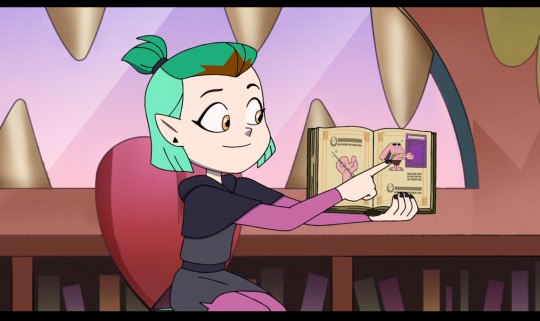
I bring this up here because the scene above, with Amity reading to the children, is the first time we see Amity's relaxed voice. This is the voice that will go on to be the most iconic and synonymous with the character. This is the mask that has been removed, and underneath, is a character who is completely fine putting on voices and reading to children, with zero care about being embarrassed.
It is also worth noting that the hair dye is starting to run thin here. The colour of Amity's hair is an important metaphor for her character arc, and here, as the mask slips, the dyed appearance is fading to reveal the roots underneath.

The storybook motif of this episode plays into this theme.
I have said in the past that Luz has a fairly flat character arc, and I meant it. But that doesn't mean she doesn't have flaws to overcome. This episode dives into one such flaw.
The reason that the series utilises archetypal storytelling so much, is because that is how Luz thinks. Luz's flaw is ignorance, or more accurately, naivety. She very much wants life to fit with the archetypes that she has in her head. That is why she gets scammed in episode two, and that's why here, she directly causes the problems of the episode. She tries to play with storybook rules, she tries to take shortcuts to friendship. This causes problems because, as I have stated, there is nuance to these characters, and as such, shortcuts don't work.

Otabin is the embodiment of this. A character warped beyond all recognition by a tiny nuance in the drawing brought to life. A little change has a big impact and turns him into a different character who cannot be treated the same way.

Interestingly, the conflict resolution is literally just write your own story and you would assume this moment works, with the cape and the staff. But it doesn't. Why? Because it's Luz writing herself into someone else's story. She's not Luzura yet, because to be Luzura, she needs to be Luz first, and she's avoiding that.
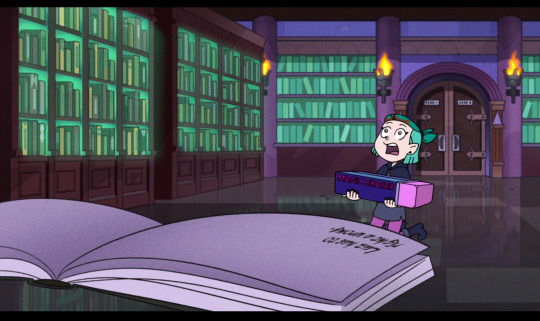
In the end, the story is written together, and it starts with:
Luz needs to right a wrong
For the new story to begin and the relationship to actually work, Luz needs to let go of preconceived expectations and start taking the story as it is, instead of adding to something it is not.
That's how she befriends Amity as the episode closes. Instead of trying shortcuts, she sees something personal to Amity and offers to help. The book. And it causes Amity to open up, slightly.
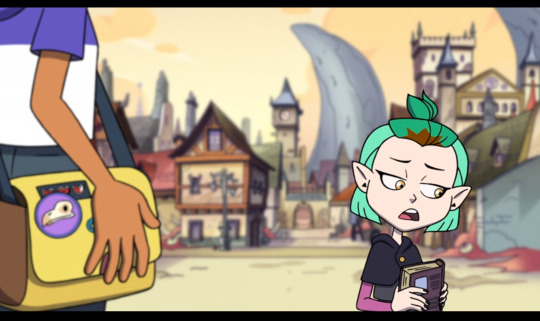
But, I titled this post The Owl House's First Reveals and I did intend to put "reveals" in plural. Because there is another character who has a side of them revealed. Eda the Owl Lady herself.

This is the episode in which we see the maternal side of Eda. Specifically, we see the lack of it. Eda is unconditionally one of the series' main parent figures. The others being Camilla, Bellos, and the Blights (Argue about Darius and Bump and whoever in the comments). But at the start of the series, she has no skill or interest in the subject, or does she? Eda takes in King and Luz on a whim, because they looked sad or in danger, and she passes that off as just something one does. The instinct is very much there, the skill? Not so much.

This episode shows Eda learning the skills of parenting. She has to put up with the babies and learn their ways in order to earn spending time with the teenagers. This is the start of Eda's arc into becoming the matron of the Owl House and the resistance later on down the line.

So, in conclusion, people are complicated. This episode sees Luz and the audience learning about the nuances of characters, even as the characters themselves learn these things about themselves.
Previous - Next
#rants#literary analysis#literature analysis#what's so special about...?#the owl house#toh#the owl house amity#the owl house luz#owl house#the owl house eda
66 notes
·
View notes
Text
What I Liked From Azula in the Spirit Temple
Now that Azula in the Spirit Temple has been out for a few days, I can confidently say I found the majority of the book compelling and worthwhile. However, it is difficult for me to say I enjoyed it due to the dark and depressing subject and its flaws, which I will cover later, but not all art is meant to be fun and I would consider Spirit Temple to be a work of art rather than entertainment. Here are the things I liked from Spirit Temple:
It Tackles Heavy Topics
Azula’s feelings toward Mai and Ty Lee’s betrayal. Her relationship with her father and mother. Azulon’s order to have Zuko killed. Her mother’s disappearance. Vengeance. Feudal piety. The consequences of going against royalty. Azula’s ability to reach into a dark place. These have been dangling plot threads since the show ended, for fifteen years, and this comic sufficiently touched on them to provide much-needed context and clarity.
The Asylum is Contextualized
A dumping ground for rebellious noble children. A place for the most traditional families to imprison their unruly daughters (read: sluts and lesbians) to punish them for “transgressions” against their proper roles in society. Scraps of humanity drifting down the river of life. This is high-level stuff with direct historical analogues. Not only is this how Azula saw her imprisonment at the asylum (dumped there to be humbled and broken) and saw herself while there (a scrap of a person), it world-builds the Fire Nation’s society in a much-needed way.
Hair-Down-and-Angry Azula
Thematically perfect. Not only does this feel like the “real” Azula bursting forth—angry, jaded, tormented, troubled—but it harkens back to pre-breakdown Finale Azula, when she was struggling with the very topics the comic addressed (see: throne room scenes). I love Hair-Down-and-Angry Azula. Some might call it Angry Wet Cat Azula. It feels like a return to the Finale when all of this “Who is Azula?” questioning began. Brilliant creative decision. Need more of it like I need oxygen.
Azula Hates Herself
This has long been speculated. Azula loathes herself and has low self-esteem despite also having immense pride, talent, and achievements to bolster her self-worth. She uses the word “loser” to describe Ty Lee and Mai, which means she views her current self as a loser. She hates that she is alone and betrayed. She hates that the best of herself doesn’t cancel out the worst. She hates that who she is is not who others want to be with. I think this is great for a prodigy who has experienced conditional love by her most influential parent.
Azula is Darkly, Horribly Conflicted
She loves her father, but also sees how he harmed her. She wants her family to be together and happy, but she also feels that if Zuko had been killed her life would have been better. She is proud of her achievements, but the consequences of what she had to be and do to achieve them makes her hate herself. Zuko was never this conflicted, even at the peak of his journey. This will take an enormous narrative effort to overcome, with likely tons of setbacks, but when it happens, it will make Zuko’s redemption look like a warmup.
There are professional authors who spend their entire careers never sniffing a character like this. I can’t say where the Avatar franchise will take Azula, and they could still fuck this all up, but this is a character capable of reaching the highest summits of literary storytelling. Capable of, not necessary will. There is not a character remaining in Avatar who can hold a candle to the moral and internal conflict found in Azula in this comic. The franchise has something special, if they handle it right.
Azula’s Desire for Family
If her family was together, that would mean none of the bad things would have happened. Her low self-esteem would be fixed by the love and admiration of her family. This is a good development. There are tons of evidence for it in the show based on how often Azula says “we” and “us” and acts like the Queen Bee of a group rather than a loner. She hates being alone and the idea of family and parental figures gives her the most security. Very realistic and compelling. Avatar has not had a character motivated by pain of loneliness and want for human connection.
Azula Continues to Use Collective Pronouns
A pattern existed in the show where Azula would very often use “we”, “us”, “our”, and other forms of collective pronouns or group references instead of “I” or “my”. The pattern continues in this comic. There are several instances where she uses collective terms when she could have said “I” or “my”. At this point, it is intentional by the writers. They are signaling something that shows up again in this comic: Azula wants community and teamwork, not isolation.
Azula is Willing to Accept Blame, But Not All of It
Just like a real person with strong will and pride would. We are all the heroes of our own journeys. Accepting blame is painful, and for a person like Azula, who has all these accomplishments under her belt, to bury herself under 100% guilt and culpability, and to allow people to denigrate those accomplishments in turn because of how "bad" she is, can likely come across as a bridge too far. She conquered Ba Sing Se, killed the Avatar, saved the capital during the Day of Black Sun. Who is anyone to tell her she did nothing right and everything wrong? Azula is also highly intelligent, which makes it easier for her to justify her actions and beliefs and craft narratives explaining it all.
Azula is recognizing she has flaws and has made mistakes. It even appears she wants to be able to talk about them. The door is not shut on listening to criticism. This makes Azula’s potential reconciliation with the heroes full of drama and dynamic conversations.
Azula Won’t Be Brow-Beat or Guilt-Tripped into Submission
If she is backed into a corner with accusations of being cruel, evil, to blame for everything, the cause of all her problems, a monster, like the Zuko apparition was doing, she will lash out. Call it denial. Call it a defense mechanism. She will not allow what she is proud of, what she feels was worth it, what has been her closely-held identity, to be thrown in the gutter. This is high-level literature and human psychology. And it holds an important implication for the future: the heroes will not be able to shame Azula into accepting their morality or worldview. Unless her feelings are taken into account, the back-and-forth dialogue observed in Spirit Temple will not happen.
Azula’s Walls Can Snap Up in an Instant
She can let her guard down and hear criticism, but if the criticism turns into a personal attack, her walls will snap back up and she will drop back into old habits and beliefs to protect herself. This is a tough problem for the narrative to solve based on its complexity, sensitivity, and need for tact, and so will require a special character to help Azula work through. I don’t think the franchise currently has such a character. Maybe a more militant, warrior-poet version of Guru Pathik could do this.
Azula Talks and Thinks Like a Feudal Princess, Not a 21st Century Teenager
This needed to happen. ATLA needs to start developing the politics of the Fire Nation if they are to successfully build out Azula’s and Zuko’s post-war dynastic struggles. This is the first time the franchise has taken this seriously. Azula calls her family traitors, thinks Ty Lee should have been grateful for having the ear of royalty. Royalty. Finally, the word is being used to describe the social dynamic between her and her friends. Great stuff. This is who Azula would be in “reality” and part of why she is so scary to us today.
Azula Sets Her Terms for Reconciliation with the Heroes
Apologies. Acknowledgments of the pain and damage they caused her. Them valuing the “good” things she has done for them, much of it from her feudal princess perspective, and some from her troubled teenage girl perspective. I don’t think this is everything she will put on the table, but it’s major pieces of the redemption and reconciliation puzzle. This is probably one of the most profound parts of the book, because it says the door is not closed between her and the heroes. Zuko being Fire Lord and the war being over are not showstoppers.
Azula Loves, and Hates, Her Dad
Her father has both hurt and helped her. She hates him for turning her into his firebending weapon, but loves him for how that led her to greatness, and the conditional love she received from him. She is a villain loving another villain. I think there is something significant here that might play a role in the future: Azula will continue to love her father until he shows he doesn’t love her. In fact, she might seek confirmation of love from him and his response might be a turning point in their relationship.
Azula is Developing Her Own Identity
She says she is the last of her kind, the only one left. Sounds like she sees herself as representing a version of the Fire Nation that doesn’t want to go down quietly, the version of the Fire Nation that Zuko needs to figure out how to redeem rather than destroy. Even though she recognizes the damage her father did to her, she retains enough pride and belief in the Fire Nation’s war to stand by him. This looks like a sign of Azula coming into her own person, even if it is villainous and could send her down a dark path. Regardless of the morality, she seems to be voicing her own beliefs, and beliefs are supremely important to developing character, as beliefs can change. Azula still has to learn the wrongness of the war. This might be her “Zuko Alone” moment equivalent to Zuko declaring his identity to the corrupt soldiers.
The Spirit Centipede
Awesome design and capabilities. It seems it was trying to pump her full of opium in the form of the beach dream whereby she falls into a forever sleep in that perfect world allowing the centipede spirit to eat her. Instead, Azula rejected it and the spirit discovered it doesn't actually know this human as well as it thought it did and so panics and tries whatever it can to get Azula to succumb to its offerings of pain alleviation. One of the best spirit designs we have seen in the post-show products in my opinion.
Coraline References
Fantastic movie. Still creeps me the hell out. I’m afraid Azula would not last a week against the Other Mother. The Centipede Spirit tried to be an Other Mother. It couldn’t hold a candle.
More Evidence Azula’s Design Was Inspired by Lady Eboshi
Page 72, Panel 3.
84 notes
·
View notes
Note
Am I the only person who doesn’t like Wonder Woman and thinks she is, in fact, a Mary Sue? I haven’t read or watched much with her in it so maybe I’m just basing my opinions on one Wonder Woman book I read where I thought she was written poorly.
But I don’t know. She’s literally everything a modern woman is supposed to be (sexy, strong, righteous, soft, etc.) and she never struggles. She’s always right, she never makes mistakes, and she’s very boring to me as a result. I haven’t seen the recent film, but I dislike the fact that they made her love babies. A lot of pressure is put on women to love babies/children and/or want one of their own, and if a woman doesn’t like or want them then she’s seen as a cold, callous bitch. So to me, that part seems like the writers put it in thinking ‘see she’s not an evil man hating feminist you guys, she loves babies!’
Idk. I know she’s seen as THE role model for women and girls but I just can’t understand her appeal. What exactly do you like about her?
Hello there!
As someone who grew up with a lot of Wonder Woman content, I have to personally disagree!
Like any major superhero, Wonder Woman gets a lot of good content and plenty of bad content, too.
Yes, she's idealized - but almost all superheroes are idealized. Superman is literally a mirror of the philosophical concept of the "Ubermensch," a term coined by Nietzsche meaning "superman" and describing an ideal human being. By this standard, he could also be described as a Mary Sue!
But just being beautiful, powerful, and good does not a Mary Sue make. These idyllic superheroes work well when they're put in circumstances that challenge them. It's fascinating to see characters that seemingly embody the highest reaches of human potential pushed to their limits, when we see that they too have flaws and weaknesses that they can overcome through perseverance.
You say that she "never struggles," but a good Wonder Woman writer knows that she NEEDS to struggle to be interesting. In shows like the animated Justice League and Justice League Unlimited, she and all the other major heroes are put in situations that challenge them on every level - physical (like fighting literal gods) and emotional (being banished from her home for bringing men to the island).
And also funny scenarios that put them at disadvantages, like being turned into children or a pig that then must be chased through the city by Batman (yes, both real episodes) that humanize them and show that they're not invulnerable.
For the more recent, live action movies, I liked the first Wonder Woman but not the second. I personally liked the fact that she was excited to see a baby, especially in the context that there were no babies on her island, because women are often expected to reject feminine characteristics to be strong.
I see your point, but I also have a different view regarding children: I think a lot of the oppression experienced by women is also experienced by children, and children are frequently dehumanized.
Not everyone who says they don't like kids is a bad person - I know plenty of great people who say they don't like kids - but I'm not really comfortable with the concept of disliking an entire group of human beings. Children have such varied personalities, just like any other group.
Granted, most people who say they don't like kids don't mean they dislike ALL kids, but it's still a sentiment I don't really like from a cultural standpoint.
As for women who don't WANT kids, I agree - it's deeply messed up that many people don't see women as complete or fulfilled unless they have kids. But (though it's been a while since I've seen it) I don't recall Wonder Woman in the 2017 movies planning to have children of her own. Plenty of women like children without intending to have them, myself included.
Again, though, I do see your point that the writers may have been trying to soften Wonder Woman in the eyes of the audience by having her love babies.
I still prefer that over the original Joss Whedon script, where a little girl at one point asks her to get a cat down from a tree (I think. Perhaps it was a lost toy) and Wonder Woman callously tells her to get it herself. To me, that plays into a sexist stereotype that women must reject all feminine attributes in order to be strong.
The sequel film, on the other hand, really embodies how NOT to write Wonder Woman in every way: largely exempt from moral criticism, inherently better than those around her, and with few meaningful challenges that aren't solved through plot convenience. She isn't "always right," however, because another flaw in that film's plot is the fact that she's learning a vague and contrived lesson of not cheating to get what she wants, though that's never explored in any way that feels human or applicable.
To conclude, I'll reiterate -- and this is just my opinion -- Wonder Woman is done GREAT when written by someone who understands the appeal of the character. Her idyllic characteristics apply to most superheroes, and can work great if the person writing her knows how to challenge her. I don't mind when she has feminine characteristics, and I love when all superheroes love kids, male and female. And last but not least, Justice League and Justice League unlimited reign supreme in terms of superhero content.
Thank you for giving me the opportunity to ramble and spill my potentially controversial opinions!
52 notes
·
View notes
Text
The assertions that Dany will "succumb" to her family's allegedly "evil legacy" or the "taint" in her blood require pathologizing her for being an abuse victim borne of rape and incest, buying into bioessentialist "genetics is destiny" argument, and decontextualizing most of the passages from her book arc. This post, with a song juxtaposed with out-of-context quotes from Dany's chapters, is an excellent example.
"Every child knows the Targaryens have always danced too close to madness." The only "mad" Targaryens were Rhaegel, Aerion, Aerys II, and Viserys III. If you want to stretch it, you can include Baelor, though he was more pious and fanatic than mad. Maegor was cruel but lucid. Rhaegar was not mad, despite being Aerys II's son. And the narrative has distanced Dany from Aerys II several times, because one of ASOIAF's central theses is not "you are your father's child," but "you can overcome your father."
"She could not look behind her, must not look behind her" is not Dany "refusing to look at her family's history." This is taken from her fever dreams in AGOT Dany IX, and what she can't look back at is an icy breath that would cause her a "death worse than death, howling forever alone in the darkness." It's the first time Dany sees the Others in her dreams, and she is the only other character in AGOT to dream of them, the other character being Bran.
"I made a horror just as great, but surely they deserved it. Harsh justice is still justice." This is Dany feeling guilty for crucifying 163 slavers. How is that a sign of madness or refusal to confront her family legacy? It's actually a sign that Dany has empathy even for the worst of humanity, even for her enemies. Also, crucifying slavers isn't evil. It's odd that the same fandom that calls Dany a slaver, slave trader, slave profiteer, and slavery enabler, also calls her a tyrant or mad for crucifying slavers. What is she supposed to do with slavers? What is the "proper" way to handle them?
The mother of monsters passage is more proof that Dany is introspective and self-critical. In children's media, shounen anime, and Marvel movies, a villain may unironically call themselves a monster, but in more complicated, nuanced, adult literature, characters who call themselves monsters usually aren't bad people. They're the self-deprecating, humble, and thoughtful characters who are reflecting on their flaws and mistakes. Again, if Dany is someone who refuses to think about the dark side of her family, she would not agonize over the consequences of using her power. Monstrosity is associated with being stigmatized, ostracized, and alienated by hegemonic forces in society, and those characters who identify with monstrosity often have something to reveal about the violence of the status quo and the normalization of oppression.
George is deconstructing the coin quote, not reinforcing it. Madness/greatness, ice/fire, east/west, north/south, sun/moon, pain/pleasure, love/hate, are all dichotomies in the novel that George sets out to show can unite in some way. As I said, most Targaryens were not "mad," and I find it odd that for a fandom as progressive as it frames itself to be, the ableist stereotyping of "foreign otherized race from the East is genetically predisposed toward madness" isn't something fans problematize more.
Dany longing for the house with the red door and wanting to rest, laugh, plant trees and see them grow, are also seen as signs of madness because of her statelessness and homelessness. If a teenage girl has been raped and abused, and is herself a product of rape and abuse, and comes from an exotic Eastern family, then apparently her longing for home is actually a bomb waiting to detonate inside her, because she's unfit to belong anywhere. It's shocking that this mentality is seen as media literate or subversive.
"Dragons plant no trees" has already been disproven by Dany's arc itself. Dany reclaims fire and blood by the end of ADWD because she realizes the peace in Meereen is false (which it is). Jon Snow goes from wanting to hire glassblowing apprentices to plant crops in greenhouses to grow food, to abandoning his vows and declaring war to save his sister, and then dies. Why is that not seen as a sign of "succumbing to madness?" The acts are narratively paralleled. Perhaps––and this may be crazy, but stay with me––the thesis of FeastDance is that you cannot grow, build, and heal a nation in soil watered with blood. No such rebuilding or regrowing is possible unless and until real change occurs, and for real change to happen, the corrupt old guard cannot stay alive.
Certainly TWOW will be a darker book for every viewpoint character, but it's interesting to see how a combination of pathologizing Dany for her gender, ethnicity, genes/biology, trauma, and stateless/rootless/homeless status as an exile/diaspora, with decontextualizing her chapters, quotes, and passages, and an overall misunderstanding of the themes of ASOIAF, to single Dany out as a "dark" character who won't be able to "outrun" her "negative family history."
139 notes
·
View notes
Text
I have finally finished the first part of the second episode and have reached the actual family conference. I have a lot of thoughts about George/Shannon and Jessica/Kanon.
I cannot really bring myself to ship either couple. They do have cute moments together, but I feel like their romantic feelings are mostly due to the fact that the other is fulfilling a need or resolving an insecurity rather than an actual connection.
George loves Shannon, but his feelings seem to be mostly helped by the fact that her fawning over him and her being formerly interested in Battler helps his insecurities and his feelings of inferiority. In a perhaps even worse way, Jessica's feelings for Kanon seem to be mostly due to him being one of the few men her age she has around (even the narration acknowledges it). As for Shannon and Kanon, and by extensions Sayo, her feelings are a complicated mess between being envious of them, admiring them, being grateful for the attention and interest and looking for a way to escape their place as "furniture". Overall, neither character seems to have genuine appreciation for their love interest as an actual person.
Another thing that bothers me is that George and Jessica come from a place of immense privilege and are, in many although different ways, incredibly self-absorbed (yes Jessica, please tell the orphan who was raised as a charity case, cannot go to high school and works his ass off as sixteen that YOU were born under an unlucky star).
While the story shows us how they are negatively impacted by this position in terms of familial pressure, they are still in a place where, in one hand, they have some measure of freedom to determine the person they want to be or present themselves as, and on the other hand, they have never suffered any amount of actual grave consequences and trauma. Because of this, their speeches of love and their protests against Shannon and Kanon calling themselves furniture ring very hollow. They do not understand Sayo's trauma and are in no way equipped to handle it and while this is certainly not their faults, their reactions really show how much they do not have the proper tools and insight to get to the actual core of the problem.
Furthermore, the cynical part of myself wonders how much their feelings will last when faced with the backlash from their choice of partners. Sure, George talks about how he does not care about what anyone will say, but will he say the same thing when his parents refuse to support him financially and he has to work a difficult or boring job to support his family? When his wife is used to humiliate him ? When he constantly faces comments and jokes about his partners? When he has to handle Sayo's trauma and the way it impacts her and her self-esteem? Hell, when he has to handle that he will never have any biological children? It is easy to say "I don't care what anyone says, I am marrying you" but the biggest obstacle is not the actual opposition, it is the length of time and the constant little annoying things that happen every day.
However what I find most interesting in this romantic nonsense is that some of these criticisms can be applied to Battler and Beatrice. By understanding the weaknesses in George/Shannon and Jessica/Kanon, we are prepared to see where Battler messes up with Beatrice and where she messes up with him. Battler can also be pretty self-involved, engaging more in the how done it that the why done it (which will eventually cause Beatrice's death). Beatrice also seems to be using Battler as a mean to an end. However, where George/Shannon and Jessica/Kanon never had the chance to overcome these flaws, Beatrice and Battler eventually were forced to face these flaws and grow up.
#umineko no naku koro ni#umineko when they cry#umineko#ushiromiya george#ushiromiya jessica#battler ushiromiya#beatrice the golden witch#sayo yasuda#letmerantinpeace
30 notes
·
View notes
Text
Okay kind of a different post than my normal stuff but I did just want to put all of these in one place. These are my character analysis slides that I’ve been working on!
Breaking down the character of Billy Batson has been so fun for me, and its by far my favorite part of the writing process. So here’s what I have so far for my interpretation of the character.
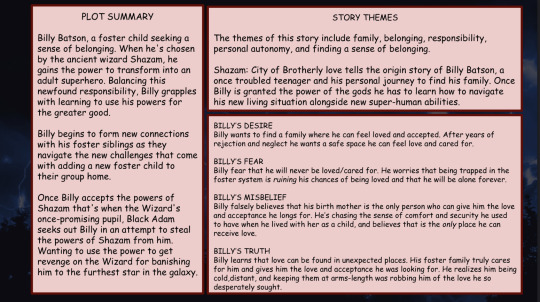
Here is my first slide where I breakdown the basic overview of my story. Just outlining the basic plot summary, the story’s themes, and the basic character arc for Billy.
As you can see it’s very similar to the first movie I’ve just modified some things here and there to add my own fun twist to Billy’s origin story.
[ MORE SLIDES BELOW ]
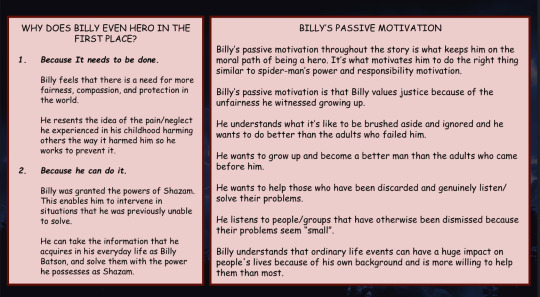
In this slide is where I breakdown Billy’s passive motivation, something I see that is necessary for all superhero characters. Similar to Spider-Man’s “power and responsibility” thing, and similar to how Batman protects and values all life because his life was forever changed by a random act of violence.
I think Billy’s passive motivation to do good is really, deeply rooted in the injustice that he witnesses throughout his childhood. He’s especially receptive to the problems of children and other vulnerable groups because as a member of those communities, he knows they get overlooked often.
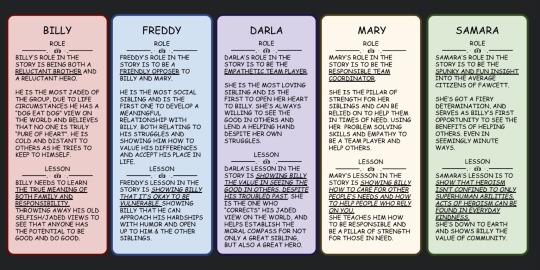
This next slide is my character breakdowns. This shows my main character and all my important side characters. They each have a lesson they inadvertently teach Billy, helping him along his path to become a good hero.
They each play a role on the team, giving them fun dynamics. This allows them all to have distinct personalities allowing for fun dialogue, banter, and character moments.
The only character you might not know on this list is Samara. She is my version of the character Cissie Sommerly. Cissie is a classic Captain Marvel character who’s most recent comic book appearance was 1978. Woof. So I thought it would be a fun idea to modernize her and bring her back into the spotlight, serving as a glimpse into the average Fawcett citizen’s reaction to the new hero, Shazam.
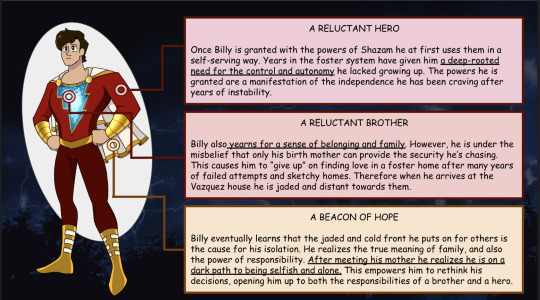
This next slide is a closer look into Billy’s character flaws. Showing how at first he is hesitant to being a brother and being a hero. It kinda explains the mistakes he makes at first that he has to learn to overcome, and shows how his introspection will help him accept his roles as both a brother, and a hero.
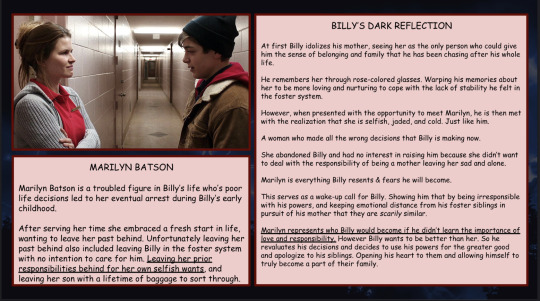
Next we have something that if I could add to the 2019 film, I would. I love love love the 2019 version of Shazam but if I could add a little more expansion of Billy’s mother into the plot, I would.
I think is really important to the core of the character. This next slide I like to call “The Dark Reflection”.
I think that upon meeting his mother, Billy realizes that they are scarily similar. That she was also selfish, careless, and only interested in meeting her own needs. This lack of compassion and responsibility from her are the reasons she ended up abandoning Billy, leaving him in the foster system once she was released from prison and having zero interest in raising him.
Billy sees the mistakes she’s made in life and realizes that he is making the same ones, prioritizing his own wants/needs over anything else, and being just overall emotionally detached.
This scares him into re-evaluating his own behavior and consciously choosing to become more compassionate for others and foster a real sense of responsibility to use his powers wisely.
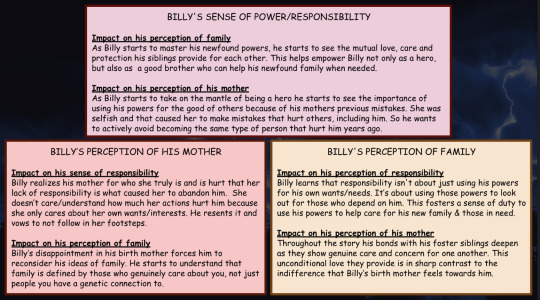
Next up, we have what I like to call “The Pillars of Character”. These are the three main “pillars” I see that are most prevalent in Billy’s story.
It’s important to me that all three of these pillars intertwine with each other, hence why I wanted to explore a little more about Billy’s mother. Adding a little more flavor text to why she is Billy’s dark reflection really helped me keep a balance between these three aspects of his character.
I also just think having all three pillars effect each other keeps a nice balance between all the aspects of his character. Showing how his character flaws effect different parts of his life and how Billy learns to grow and change for the better.
In summary, this is what I have for Billy’s character breakdown, showing his character arc for his origin story and how he learns to grow into a hero. Anyways, I hope you enjoyed because I had a fun time making this! I also have a lot more to share like individual character sheets for Billy and all my side characters, Three act story structure break downs, and other stuff too. So if you like this one maybe possibly I could do a part 2 soon.
Okay byeeeee!! ⚡️💕
#billy batson#captain marvel#captain marvel dc#dc comics#fawcett comics#shazam#shazam 2019#shazam: fury of the gods#Shazam:CoBL
32 notes
·
View notes
Text
[Spoilers about Eda's storyline below]
Do you know what I love about Owl House?
It's that not only is it extremely lgbt+ representational, and not only does it point out the flaws in organised religion and with a focus especially on the witch hunter era, but it also touches really well on chronic illnesses.
Specifically, I'm talking about Eda's curse.
It started as a teenager, her mother became so overcome with finding a cure for it that she lost the point - that it's Eda's curse, and what Eda wants to do is what should be important - and Eda ended up feeling like she tore her family apart because of simply having a curse.
Now, disregarding the origins of the curse, her arc is extremely relatable for the chronically ill. She can't control it, it gets worse under stress, she's often exhausted because of it, she has to take potions to keep it in a manageable condition, and most of all, it can't be cured.
Even when the curse is halved at the end of season 1, it's not gone, just returns to a stage that is more manageable again. Like having a surgery; it isn't necessarily going to cure you, but it can give you more time, or make your illness more manageable for a while.
Then, again, during season 2 when she accepts her sickness, she says something along the lines of "I may not like it, but you're a part of me", which I think is also mentioned during the episode with her mother. A big part of having a chronic illness is that point where you have to sit down and face the fact that you are sick, and probably always will be sick, and that acceptance is necessary in order to keep going on. It's something very personal and very relatable for a chronic illness sufferer to hear, and on top of that, it was an extremely beautiful scene to watch. I cried many, many tears.
And even as she "levels up" and becomes a harpy-lady, it doesn't stop the curse from having negative side effects - she can still no longer do natural magic, and the curse corrupts natural magic she takes part in. And on top of that, she still has to take potions to keep it under control, and still gets tired out by going into the harpy state. The curse still affects her in negative ways, but accepting the curse means she's able to forgive and allow those parts of herself, instead of rejecting them. That does wonders for your mental health.
Her illness is magical (as per being part of a children's TV show), and can be used to help the plot and spun in that "my illness makes me strong" way, but she's never 'cured' - she simply finds ways to deal with her illness that suit her. Using her illness to fight bad guys, only to become extra tired, is just like what me and my older sister refer to as "mission mode", which I think is something many chronic illness sufferers can relate to - that decision to do The Thing you need to do, while knowing it'll take all your energy for that day - possibly longer -to do it (maybe it's calling the doctor, maybe it's doing housework that has piled up, or going to the corner shop to buy more milk - it could be anything, for anyone).
I just think Eda is a very good example of chronic illnesses and how, even if you can find the right medicine, or get the right surgeries, even if you can live a practically normal life, your illness won't just go away. It stays a part of you, and accepting it doesn't mean you've lost to it. (Granted, season 3 hasn't come out yet, and who knows if she'll be cured then. I actually hope she doesn't get cured!)
Anyhoo, it probably wasn't intentional, but it's something that has made me, and especially my housebound older sister, feel seen. It's just very cool to see it represented in a character as badass and confident as Eda the Owl Lady. And also to see it represented in someone who is regarded as an incredible parent. Disabled people way too often are made to feel like parenthood isn't an option, but she manages it with style, and she's the ultimate bad girl too! Seriously, I've got massive love for this show for so much of its character representation. I could go on for days talking about it!
#the owl house#toh#cartoon#cartoon network#the owl lady#eda#eda toh#toh eda#illness#chronic illness#disability#eda clawthorne#clawthorne#representation#rant#lulu on the mic
50 notes
·
View notes
Text

Shin sekai yori (ep. 15,21,24,25)
I grew to like the characters and direction this show took as its story progressed. It felt like a really deep journey that begged you to ask questions about the world you live in and how people are treated within that world. From the New World continued its story in a way that was quite unexpected. The story shifted its focus from one of a society unfairly governed by the people in power to themes about power and human nature. However, the effects of such a society are felt through the story and its conclusion. The main ideas seen throughout the ending episode are those of primal children, chaos and order, and what it means to be human.
The idea of the primal child shows up once more in the latter part of the show in the daughter of Maria and Mamoru. This child was taken away at birth from her parents and raided amongst the monster rats as one of their own. Being raised this way prevented the child from feeling any form of sympathy towards people of her own kind, believing she was a completely different species. As a result, her nature came out to be more feral and violent, due in part to Squealer's influence. This highlights the ideas Aria mentions in their paper titled “Wild Children” once more by displaying the violent tendencies of a “wild child.” However, just like the special case discussed in the paper about an average boy going on a killing spree, we are left without information about whether or not this girl was considered “ill” or “dangerous” natively. In fact, it's mostly likely a commentary on how anyone, even the most innocent looking, could turn out to not be what they seem, making the dystopian idea of eliminating the possibility of a dangerous individual impossible and intangible. Instead, we as a society should focus on providing nurturing environments for children growing up. This style of care should allow them freedom to be themselves while also providing them with emotional love and care and proper consideration for the problems they may face during development.
Chaos and order are themes that arise often in dystopian societies. The idea that overwhelming control can bring about peace is flawed because the balance of human desires can never truly be overcome. In this society, the government exerts discipline by changing the psyche of the human, making them fear the infliction of pain onto others and going out of line. Furthemore, potentially harmful people from their ranks are eliminated and other humans who the power in control deemed “threats” (such as the slaves nations of the past) were converted into monster rats to prevent interference. These actions created a form of control that was overwhelming. Everything was accounted for but the freedom of the self and the freedom of non-power wielders were hindered. By taking away the ability to think differently or underperform compared to the rest of society, the person is dehumanized. Their free will is revoked. In a more literal sense, this was the case for the monster rats. As humans, they were literally stripped away of their humanity because they were deemed inferior and threats. This mimics the attitudes seen in our world with racist tendencies and the abuse and enslavement seen throughout our history between people. This want for control and order causes unfair treatment in some other area that will incite a reaction of chaos that will balance out things. It’s a matter of time before balance is reinstated and some form of reaction happens. It’s wrong to believe that anyone is above anyone else and the value of the human mind and person should be appreciated. Our differences make us who we are and that’s good. We should embrace this and live together. There is no “power” that makes anyone intrinsically better than the rest. Our minds and free-will make us who we are. The uprising by the monster rats was a cry for help to finally be recognized on the same level as the existing humans. The bloodshed and war was the chaos caused by the over exhausted “order” brought by humans with power. No one should be a slave to anyone else.
Overall, I think the show was wonderful. I will be finishing off the episodes I skipped over on my own to get a complete feeling for it. I’d recommend this to anyone who wants a show with a massive dose of social and political commentary.

12 notes
·
View notes
Note
Okay but, IF Raven cleans up her act, Tai, Qrow, and ESPECIALLY Yang shouldn't take her back.
She burned her bridges with them, the kindest thing she could do is respect their wishes for her to stay away.
First of all, I feel like this is very much a value judgment on a complicated subject that varies from person to person, and while I personally would not be inclined to forgive Raven in her family's place, I don't think that's the direction the narrative is going to take, and there are a number of reasons for that.
First is that RWBY as a show is very committed to the idea of continually moving forward, the belief that the mistakes or tragedies or other negative events of the past shouldn't determine the course of the future. We see this with the way it offers redemption to those who choose to reach out and take it (Ilia, Emerald, even Hazel, as sloppy as his "arc" feels). It's set up other characters like Mercury and Raven in the same way, and Cinder's story arc certainly seems like it'll involve freeing herself from the shackles of the past and the more literal ones Salem's placed on her, even if I'm not sure she'll ever be truly good. Even Neo has the potential to come to terms with her grief for Roman, depending on what happens to her in Homosexual Hell.
By contrast, the characters who don't get redemption arcs are the ones who fail to move forward, to overcome their flaws and make the right choices. Adam refuses to let go of his belief that he owns Blake and his need to make the world hurt the way he did... and dies because of it. Ironwood refuses to look past his own paranoia and insistence that he's the one who's always right... and dies because of it. Leonardo Lionheart fails to conquer his fear of Salem... and dies because of it. Roman refuses to fight for the side that's in the right instead of the side he thinks will win... and dies because of it.
(Hazel, amusingly, actually does (kind of, barely, if you squint) start processing his grief for his sister, his misplaced blame, his hopelessness and denial... and dies because of it lmao)
You know what? I actually want to talk a little more about Hazel's "redemption" "arc", because while I don't particularly like the execution, I think that what (I think) the writers are going for thematically is pretty interesting.
I... don't think Hazel actually, truly redeems himself. I think he just projects his dead little sister onto Emerald, turns on Salem because he doesn't want to see her die again, and gets an easy out by dying instead of ever having to actually atone for or come to terms with all the awful things he's done. Even when Salem calls him on his betrayal, he frames it in terms of his sister, he says "I'm doing what Gretchen would have done" (Witch). It's not "I won't let you hurt those children". It's not "I'm tired of all the death and destruction, I won't let it continue". It's about Gretchen, just like everything else Hazel's ever done. He's taking a few steps forward, but he's not truly advancing the way other characters do. He's caught in this odd limbo between the characters that truly seek to change and do better (Emerald, Qrow, Ilia, etc.), or just overcome the obstacles life has thrown at them (Team RWBY, Jaune, etc.), and those who are stuck in the past, who cling to their fears and flaws and grievances (Adam, Ironwood, Lionheart), where he's not quite actually seeking redemption, but he's taking kind of the first baby steps to get there.
Admittedly, it's kind of frustrating to me that Hazel never truly gets called to account for his actions, but I do think this is a cool way to play with the themes of redemption and forgiveness and personal growth and atonement that run throughout the show.
That said, I'd personally much rather have had RWBY force Hazel to grapple with all the terrible things he did under Salem's direction. He's never forced to confront the fact that he beat the shit out of a child (repeatedly) and murdered a bunch of Mistral's Huntsmen (or at least helped Tyrian do it, so he's an accessory to murder at minimum), which probably led to a lot more indirect deaths because those Huntsmen couldn't help protect the Kingdom. Instead, he gets to die as he lived: in deep denial and unable to properly process his experiences and emotions.
Okay, back to the original topic. I kinda got off track there. Anyway...
Second, I don't think cutting her out of their lives fits with the established characterization of the people Raven considers her family. Yang's too loving, too forgiving to not give Raven a chance if she looks like she's changed. Just look at the way Yang never holds a grudge against Ruby for fucking off to Haven when Yang needed someone, anyone, to help her through the loss of her arm or Qrow for following Ruby, or the way she still loves and respects and cares for Tai despite the way she was forced to grow up fast when he shut down after Summer's disappearance, or the elephant in the room, her relationship with Blake.
Yang's so desperate for a mom, a parent, for any adult at all, who will provide her with unconditional love and support, who will take her burdens onto their own shoulders instead of adding more of a load for her to carry, that I truly believe she'd be willing to forgive Raven for a chance to fill that void. I think she was ready to do it all throughout Volume 5, right up until their confrontation in the vault.
Slightly off-topic, but on the subject of the adults making more work for Yang, I have a sneaking suspicion that she's had to take care of Qrow when he was drunk more than once. We know from the fact that Ruby's had negative reactions to Qrow's drinking at least twice (when he finds Oscar and when he starts drinking harder in the early/middle parts of Volume 6) that the narrative is not treating his alcoholism as a cool, funny quirk, it's treating it as a serious character flaw that has negative repercussions on the people around him. Given that we know Yang tries to shield and care for Ruby as best she can, I would not be surprised to learn that she also tried to hide Ruby from the sight of Qrow at his worst. Tai seems a bit checked out in general, like he tries to be there for people but never seems to quite grasp what they need or how to provide it, so I would not be surprised to learn that Yang at least had to help him out when Qrow's issues spilled over onto his family. I think that might also contribute to the way Qrow seems to have a closer relationship with Ruby than with Yang (along with the friction over her mother), although obviously he loves both his nieces very much. This is all conjecture, though, obviously, albeit conjecture supported by (my reading of) previous characterization and narrative treatment.
Tai, for his part, seems a bit stuck in the past. What little he's told Yang about Raven is clearly colored by nostalgia, and while he's aware of her flaws, he doesn't judge her as harshly as Qrow does. He's insulated on Patch, teaching at Signal and tending to his home, whereas Qrow's out in the wider world, seeing the effects of Raven's banditry firsthand. Tai seems content to be out of the fight, to not really have to worry about things beyond his home and his family. I think that if Raven wanted to make that family whole again (or at least as whole as it can be at this point), he'd let her.
Qrow, on the other hand, is the one I can really see telling Raven to fuck off. Her return to the tribe (and the way she abandoned her family to do it) is a point of contention between them, as we see in Volumes 4 and 5, and from what I remember, he's pissed at her during the Battle of Haven. Qrow's much less forgiving than his niece, and I think he's the likeliest of the three to tell Raven to pound sand if she tries to redeem herself, but he's also so desperate for a family and the sense of belonging that comes with it that I could absolutely see him eventually working out his issues with his sister and allowing or even welcoming her back into his life.
Does Raven deserve it? Who knows? Do I think Raven will get it? Yeah, kind of, it would fit the theme RWBY is running with.
24 notes
·
View notes
Text
The musketeers
Spoilers for seasons 1 and 2
This is one of my favorite shows. I mean it has everything I want in a show: handsome men in uniforms, sword fights, loyal brotherhood, romance, humor, and good overcoming evil.
Athos my poor depressed boy. I love him. I know many fans of the show dislike him for ordering Milady’s death. But I mean what would you do in that situation? If you found out the woman you love had lied to you throughout your marriage and then you find her standing over your brother with a bloody knife in her hand? Would you believe her if she said it was because Thomas was trying to force himself on her? I think Thomas confronted her about her past and was going to go tell Athos and she killed him in a panic. Athos has to order her death for this, but he carries that guilt for years and spends his time off drinking to cover the pain. Thankfully he found his purpose as a musketeer and was able to function through the heartache. He is the one in charge on missions despite the fact that Aramis has been a musketeer longer. Captain Treville trusts Athos as his second in command and eventually makes him the next Captain. He becomes a mentor to D’Artagnan teaching him how to control his temper during a fight and not let his opponent get in his head. His dry humor makes me laugh...And I just think he’s so handsome with his blue eyes, and though his smiles are rare, when he does smile his whole face just lights up. He is best swordsman in the regiment.
Aramis the most handsome and charming. For all his charm with women, he is deeply lonely and longs for a family. He’s been a musketeer the longest of the boys. He was at the massacre of Savoy. He watched 20 of his brothers all die and Marsac abandon him in the snow. He was wounded himself, but survived his wounds. On missions he can be playful, but he knows when to get serious and focus on job. He takes charge on missions when Athos isn’t there. Very flirtatious with the ladies, but sometimes says the wrong thing and gets slapped by Constance. He’s really good with children, helping Agnes get back her baby from the old queen mother and her men. In the episode, Rebellious Woman, my favorite scene is him giving Ninon his cross necklace to comfort her when she is about to be executed. His faith is very important to him and at funerals he is the one to pray or quote scriptures. He is the most skilled as a medic and has sewed up many of Pothos’ wounds. He is willing to give up his life to protect others like when the idiot jumped on a bomb to protect the king, the queen, and the others in the crowd in the episode Slight of Hand. He is best marksmen in the regiment. (Fatal flaw: loving women who are already married or spoken for, which has terrible consequences: Adele is murdered, he and the Queen are almost executed, Margaruite commits suicide.)
Porthos the most protective and caring. He grew up poor in the court of miracles and lost his beloved mother at a young age. Yet he overcame all the obstacles and worked his way up from the regular infantry to be one of the elite musketeers. He can use anything as weapon like when he uses a fork to duel a sword welding red guard and win. He is proficient as a medic and was able to remove the musket ball from Charon after he was shot. He didn’t want to kill Charon even after he betrayed him and was trying to kill him. His love interests, like Flea and the widow Alice, don’t last long as he is a dedicated musketeer who will never be able to give up soldiering. He gives the best bear hugs and has the best laugh. He is the best at hand to hand combat in the regiment.
D’Artagnan the rookie. A skilled sword fighter who can keep up with Athos. His temper at times gets the better of him. He is a loving son devastated by his father’s death and comes to Paris to avenge him. He ends up finding his place as a musketeer. He is mentored by all the boys, but mostly by Athos. He becomes the best of them all through their lessons. He falls in love with Constance and eventually marries her. If anyone harms Constance they better be prepared to die...see Rochefort.
Constance basically the female musketeer. A warrior and fiercely loyal to her friends. Begins the show as the wife of a cold, uncaring man who constantly puts her down and talks down to her. Despite this there is a fire in her just waiting for the opportunity to explode. She meets D’Artagnan when kisses her to hide from his pursuers, she immediately pulls a knife and threatens to gut him like a fish. She goes on to save D’Artagnan’s life in first episode by shooting a man who sneaks up on him in a fight. Later D’Artagnan teaches her to shoot and swordfight and she becomes a master at both. She often slaps Aramis for being cheeky. In season 2, she becomes the Queen’s companion and most loyal friend. She saves baby Louis’ life by taking him to the laundry for the steam to help him breathe and is almost executed for it. She goes with the Queen to Emilie’s camp to protect her. She keeps Aramis and Anne’s relationship a secret even when she is almost beheaded for not confessing it.
King Louis a weak king. He is basically just a puppet king, because his first minister is the one who really runs the kingdom, which causes trouble for Louis later on. He acts like a child often slamming doors and throwing tantrums when things don’t go his way. He finds a way to blame everyone else for all his problems. He makes me laugh with how ignorant and innocent he is at times and most of his lines are just hilarious in general. He does have moments where I start to like him, then he switches back into his rude and ungrateful attitude and then I really just want to reach through the screen and slap him like Constance slaps Aramis.
Queen Anne kind, caring, and compassionate. She truly cares for the people of France and always tries to use her position as Queen to help make their lives better, like pardoning prisoners at Easter, and giving money and food to the poor. She speaks on behalf of Ninon at her trial. She goes to meet the revolutionary leader Emilie in person at her camp to speak about her grievances even though this puts her in grave danger. She is deeply lonely in the palace as her ladies-in-waiting are untrustworthy and her husband neglects her. She finally gets a true friend and confidante in Constance. She falls for Aramis after he saves her life. Her attraction to Aramis is so obvious she practically loses her breath every time he enters the room, but I mean who wouldn’t the man is devastatingly handsome. She is hurt when she sees the cross necklace she gave Aramis around Ninon’s neck. Despite her gentle nature she can be a warrior. When Rochefort assaults her, she uses her hairpin to slice his eye causing him to have to wear an eyepatch for the rest of his life. Some of the French people hate her for being from Spain.
Captain Treville a dedicated captain to the musketeers and fiercely loyal to France. Like a father figure to King Louis and to the musketeers. Has to make hard decisions to secure the kingdom sometimes at the cost of his men...the massacre of savoy. A lot of heartache could have been avoided if he just accepted the position of first minister when the king first offered it; Rochefort never would have gotten so powerful if he had. He eventually becomes first minister of France. Close friend to the Queen.
Cardinal Richelieu the man who really rules France. Hates the musketeers and constantly tries to discredit them. Tries to have the Queen killed after the king laments the fact that she has not produced an heir. Believes his evil is justified since it’s for the good of France. Uses Milady to do his dirty work. The kingdom is left without a strong leader when he dies leaving the door open for Rochefort to take control.
Milady wife of Athos until she murdered his brother. In Season 1 she is an agent of the cardinal. Tries to have Athos killed multiple times for revenge. Frames D’Artagnan for murder. Murders Remey the man who saved her from the noose. Kidnaps Constance and holds her hostage. In Season 2 she is involved in selling men into slavery. Later she becomes the King’s mistress. She does help the musketeers to save the king and the royal household when they are held hostage, and later breaks Aramis out of prison. Despite that I still have a hard time trusting her. She claims to still love Athos asks him to come away with her to start a new life (even though she spent all of season 1 trying to kill him). Her love for luxury makes her do many evil things: example in season 2 she kills a woman to take her silk dress in order to look the part of a courtier to gain entry to the palace. (which didn’t make sense to me because she knew where all the secret passageways in the palace were from working with the cardinal and what happened to all the pretty dresses she had in season 1)
Rochefort evil, evil, evil! Former tutor to Queen Anne to teach her of France before her marriage. He worked for the cardinal as a spy in Spain. He was caught and the cardinal allowed him to be held hostage and tortured for years. Agrees to be an agent of Spain in order to return to France. Obsessed with Queen Anne and willing to do anything to have her. He gains the King’s trust and becomes the first minister. Assaults the Queen in her bedchamber. Blackmails Marguerite. Poisons the king. Was very, very close to taking the kingdom. About to strangle Anne to death after she refused him until Constance and Aramis burst in the door and Aramis once again saves the Queen. Finally taken down in a team effort by our favorite musketeers in very intense fight with D’Artagnan making the final strike with sparking fury into his heart then he slumps to the ground and dies.
***There is a reason the Bible says, Thou shalt not commit adultery. It harms not only the marriage, but the children, and everyone else involved. Aramis and Anne, as much as I love them and think they are a cute couple, by having their affair and their son as a result, gave Rochefort the perfect ammunition to twist the king’s mind against the Queen and his musketeers. So many people were affected: Doctor Lemey was beheaded, Constance was nearly beheaded, Marguerite killed herself, and Aramis and Anne themselves were almost executed. It made good drama for the show and the last two episodes of season 2 had me on the edge of my seat, but it would have been better for everyone if they hadn’t crossed that line.
6 notes
·
View notes
Text
Chapter 1
Henry Creel x OC
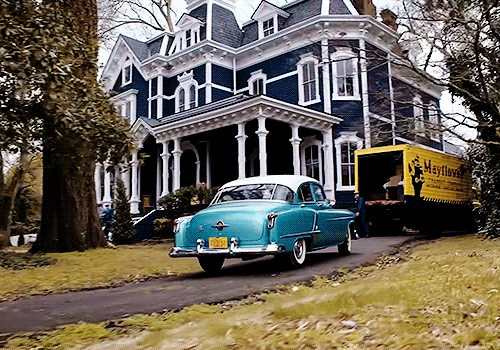
1959
"Christine, come downstairs and meet our new neighbors."
I sighed, placing my pen atop the open notebook in front of me. I'd been attempting to ignore the social commotion downstairs, to shrink into the background, hoping to be forgotten. To my dismay, it had only worked for a few minutes. My mother had obviously sensed my absence and called for me.
Only yesterday, I'd seen the shiny blue car pull into the driveway of the house next door, a moving van puffing along behind its trail. I never expected anyone to move into the house with the stained glass rose on the door. It had been standing since the turn of the century, and rumored to be haunted. I'd wanted to catch a glimpse of these individuals at the time, but my shyness had overcome me, and caused me to scurry back inside my own house, cutting my impromptu walk short. Now, curiosity resurfaced, but the idea of social interaction weighed heavily on my shoulders. I dragged my feet as I stood up from my desk, left my room, and ventured cautiously out into the hallway. I lingered at the top of the carpeted stairs, crouching down to peer through the elegant bars of the banister, as if fearing the bite of a predator.
Through the little cage, I saw four people standing in our sunlit foyer. A family. They seemed nice, and normal, but perhaps a bit too perfect. Like a painted portrait of a family, instead of actual people.
My mother quickly honed in on me, causing me to abruptly stand up.
"Come downstairs, now," she said patiently, with a faux sunny smile. I knew that look. She was irritated, but she didn't want to snap at me in front of our guests. At this point, it was better to simply obey her. Her composure could shatter like glass if tested.
I nervously smoothed my frilly lace skirt, my palms slightly sweaty. I lightly jogged down the stairs. One step, two steps, a third. When I finally reached the bottom, I was relieved to find that the attention wasn't solely on me. I hated that—it always felt like my own personal spotlight, when all eyes were on me. A light I'd desperately want to switch off.
My mother seemed happy, though. "Ah, there you are!" She chirped. She touched my forearm and encouraged me closer, which I allowed, reluctantly. She guided me front and center, her hands wandering to my shoulders, showing me off as if I were a pretty little doll. Yet it only reminded me of my frumpy appearance. My black hair, long and stringy, stopped at my shoulders. My face was pale, and freckled, and a bit too round. A pair of gold-rimmed glasses were perched on my nose, and the eyes behind them were mismatched. The right green, the left brown. A feature I always wished I could change about myself.
"This is my daughter, Christine." My mother's sunny smile turned up a few impossible watts. "Christine, this is the Creel family."
The adults were Victor and Virginia, and they had two children, Alice and Henry. Victor seemed pleasant enough, but Virginia made me…uneasy. She smiled, rosy-cheeked, blonde hair perfectly curled…but her demeanor had a plastic feel, fake. Her ironed dress and manicured nails screamed perfectionism, and control. She greeted me kindly, but her smile grew forced, as if she were judging my every flaw.
Alice bounced right up to me, blonde ponytail swinging. Sweet, bubbly, and outgoing, she seemed delighted to be in the presence of another girl her own age. Well, anything to be free of Virginia's scrutiny.
"Hi, I'm Alice!" She giggled. She held out a hand, clad in a white silk glove. "I just know we're going to be best friends!"
I briefly stared at her outstretched hand, until my mother's grip subtly tightened on my shoulders. Uneasy, I reached out and took her hand. Instantly, my mind thought of the millions of unclean things that could be lurking on her skin. Anxiety flared briefly in my chest, but I forced myself to hold on. She gave my hand a quick, friendly shake, and then let go, to my immense relief. Even as she pulled away, a kind of grimy imprint of her touch lingered on my palm. My thoughts spun, and I hugged myself nervously.
Guilt had joined in with the chorus of unpleasant emotion. I hated to act like everyone had leprosy, but I couldn't help it.
Alice didn't appear to notice, however. She began rambling about Barbies, and make up, and glittery nail polish…things I'd never had much of an interest in. It was quite easy to tune her out, and for something else to catch my eye. Someone else.
The "perfect family" illusion was broken; a black sheep, a crack in the facade. Standing away from the others, almost in the corner, was a boy, with slicked back hair and stunning blue eyes. He was dressed rather formally, his flannel shirt tucked in. This was…Henry, I assumed. He was the only one who hadn't said hello. He hadn't said a single word, in fact. He wasn't even looking at us, his gaze turned towards another room in the house.
He was like a ghost; small, quiet, and easily forgotten. I felt a sudden chill, a shiver that crawled down my spine. One glance at his demeanor, and I knew him. I knew that posture. I knew that sad, distant expression on his face. I'd seen it myself sometimes, when I glanced in the mirror.
He must've sensed me staring at him, for his blue eyes suddenly met my discolored ones. In that moment, in that brief second, I felt a strong pull towards him; my loneliness acknowledged his own with a silent, intimate nod of understanding.
"Oh, don't mind my brother," Alice cut in, rolling her eyes. "He's not very friendly."
"He seems okay," I replied, quietly. Defending him? He was still watching me, but his expression was impossible to read. His walls were impenetrable, much like my own. It fascinated me. Even the buzzing, staticky discomfort of that handshake had faded into the background.
"I think we should be heading out," Victor said. "It was delightful to meet you both."
"Likewise," my mother responded, effortlessly. She gave me a quick shake, prompting me to respond.
"Nice to meet you," I recited.
Goodbyes were exchanged, and our new neighbors headed out the door, in single file. Virgnia had reached out and tugged on Henry's arm, encouraging him out with them. A gesture I was quite familiar with. He went along willingly enough, but remained silent. Oddly enough, Virginia had never pestered him to speak, as my mother would have.
Even as the door closed behind them, I recalled that moment with Henry. How we related to each other, without saying a word. I knew, right then, that he was going to be quite the mystery to solve.
#henry creel#peter ballard#001 stranger things#st vecna#stranger things#stranger things s4#henry creel x oc#fanfiction
6 notes
·
View notes